The Muppet Movie
Brief Synopsis
Cast & Crew
James Frawley
Steve Whitmire
Ira F Grubman
Bruce Kirby
Madeline Kahn
Olga Felgemacher
Film Details
Technical Specs
Synopsis
Kermit and the gang decide to take a trip to Hollywood. They begin their journey on a bicycle pedalled by Kermit, but friends accumulate along the way, and they change vehicles to accomodate them. They have the additional challenge of fending off the entreaties of the heartless Doc Hopper who wants Kermit to make some advertisements promoting fried frog legs. Kermit must also cope with his amorous feelings for Miss Piggy, and hers for him. Once in Hollywood they encounter many stars.
Director

James Frawley
Cast
Steve Whitmire
Ira F Grubman
Bruce Kirby
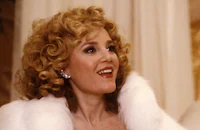
Madeline Kahn
Olga Felgemacher
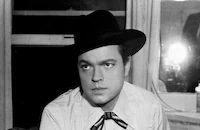
Orson Welles
Caroly Wilcox

Steve Martin
Lawrence Gabriel
Buz Suraci

Austin Pendleton
Arnold Roberts

Bob Hope
Jim Henson
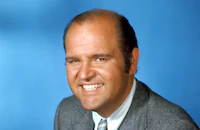
Dom Deluise
Paul H. Williams

James Coburn

Mel Brooks

Charles Durning
Bob Payne

Carol Kane
Caroll Spinney
Dave Goelz
Jerry Nelson

Edgar Bergen

Milton Berle
Michael A Davis
Eren Ozker
H. B. Haggerty

Richard Pryor
Bruce Schwartz
Scott Walker
Tony Basilicato
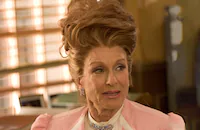
Cloris Leachman
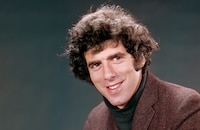
Elliott Gould
Kathryn Mullen

Frank Oz

Telly Savalas
Richard Hunt

James Frawley
Tommy Madden
Adam Hunt
Crew
Sherry Amott
Kenny Ascher
Martin G Baker
Sidney R. Baldwin
Edgar Bergen
Ulla Bourne
Jack Burns
Gwen Capetanos
Ed Christie
Joe Collins
David Dockendorf
Charles Durning
Richard Edesa
Buck Edwards
Bonnie Erickson
Faz Fazakas
Fred Fisher
Penny Adams Flowers
Michael Flynn
Ian Freebairn-smith
Ian Freebairn-smith
Michael K Frith
Les Gobruegge
Richard Goddard
Dave Goelz
Dave Goelz
Horst Grandt
Christopher Greenbury
Julia Harmount
Calista Hendrickson
Jim Henson
Jim Henson
Bruce Hill
Lindsay Hill
Richard Holloway
Richard Hunt
Larry Jameson
Jerry Juhl
Mari Kaestle
Julius King
Lynn M Klugman
Robert L Knott
David Lazer
Janet Lerman-graff
Charles Lewis
Kermit Love
John Lovelady
Robert Lowry
Leigh Malone
Isidore Mankofsky
Isidore Mankofsky
Johnny Mathis
Wendy Midener
Kathryn Mullen
Paul Nelson
Kurt Neuman
Ben Nye Jr.
Frank Oz
Frank Oz
Steve Polivka
James Potter
Marcia Reed
Lee Rose
Don Sahlin
Joel Schiller
Gus Schirmer
John Shannon
Shirley Snyder
Tom Southwell
Martin Starger
Teresa Stokovic
Amy Van Gilder
Caroly Wilcox
Paul H. Williams
Paul H. Williams
William Wistrom
Ron L Wright
Film Details
Technical Specs
Award Nominations
Best Score
Best Song
Articles
Richard Pryor (1940-2005)
He was born Richard Thomas Pryor III on December 1, 1940 in Peoria, Illinois. By all accounts, his childhood was a difficult one. His mother was a prostitute and his grandmother ran a brothel. His father was rarely around and when he was, he would physically abuse him. From a young age, Pryor knew that humor was his weapon of choice to cut through all the swath he came across and would confront in his life.
After high school, he enlisted in the Army for a two-year stint (1958-60). When he was discharged (honorably!) he concentrated on stand-up comedy and worked in a series of nightclubs before relocating to New York City in 1963. In 1964, he made his television debut when he was given a slot on the variety program On Broadway Tonight. His routine, though hardly the groundbreaking material we would witness in later years, was very well received, and in the late '60s Pryor found more television work: Toast of the Town, The Wild Wild West, The Mod Squad ; and was cast in a two movies: The Busy Body (1967) with Sid Caesar; and Wild in the Streets (1968) a cartoonish political fantasy about the internment of all American citizens over 30.
Pryor's career really didn't ignite until the '70s. His stand up act became raunchier and more politically motivated as he touched on issued of race, failed relationships, drug addiction, and street crimes. His movie roles became far more captivating in the process: the piano man in Lady Sings the Blues (1972); as a wise-talking hustler in a pair of slick urban thrillers: The Mack (1973) and Uptown Saturday Night (1974); the gregarious Daddy Rich in Car Wash; his first pairing with Gene Wilder as Grover, the car thief who helps stops a runaway train in his first real box office smash Silver Streak (both 1976); and for many critics, his finest dramatic performance as a factory worker on the edge of depression in Paul Schrader's excellent working class drama Blue Collar (1978).
On a personal level, his drug dependency problem worsened, and on June 9, 1980, near tragedy struck when he caught fire while free-basing cocaine. Pryor later admitted that the incident, was, in fact, a suicide attempt, and that his management company created the lie for the press in hopes of protecting him. Fortunately, Pryor had three films in the can that all achieved some level of financial success soon after his setback: another pairing with Gene Wilder in the prison comedy Stir Crazy (1980); a blisteringly funny cameo as God who flips off Andy Kaufman in the warped religious satire In God We Tru$t (1980); an a ex-con helping a social worker (Cicely Tyson) with her foster charges in Bustin' Loose (1981). He capped his recovery with Live on the Sunset Strip (1982), a first-rate documentation of the comic's genius performed in front of a raucous live audience.
In 1983, Pryor signed a $40 million, five-year contract with Columbia Pictures. For many fans and critics, this was the beginning of his downslide. His next few films: The Toy, Superman III (both 1983), and Brewster's Millions (1985) were just tiresome, mediocre comedies. Jo Jo Dancer, Your Life is Calling (1986), was his only attempt at producing, directing, and acting, and the film, which was an ambitious autobiographical account of a his life and career, was a box-office disappointment. He spent the remainder of the '80s in middling fare: Condition Critical (1987), Moving; a third pairing with Gene Wilder in See No Evil, Hear No Evil; and his only teaming with Eddie Murphy in Harlem Nights (1989).
In 1986, Pryor was diagnosed with multiple sclerosis, a degenerative disease of the nervous system that curtailed both his personal appearances and his gift for physical comedy in his latter films. By the '90s, little was seen of Pryor, but in 1995, he made a courageous comeback on television when he guest starred on Chicago Hope as an embittered multiple sclerosis patient. His performance earned him an Emmy nomination and he was cast in a few more films: Mad Dog Time (1996), Lost Highway (1997), but his physical ailments prohibited him from performing on a regular basis. In 1998, The John F. Kennedy Center for the Performing Arts in Washington gave Pryor the first Mark Twain Prize for humor. It was fitting tribute for a man who had given so much honesty and innovation in the field of comedy. Pryor is survived by his wife, Jennifer Lee; his sons Richard and Steven; and daughters Elizabeth, Rain and Renee.
by Michael T. Toole

Richard Pryor (1940-2005)
Quotes
Someday we'll find it, the rainbow connection. The Lovers, the Dreamers, and me.- Kermit the Frog
It's a good thing frogs can hop, or I'd be gone with the Schwin.- Kermit the Frog
I'm a professional. I've had three performances.- Fozzie Bear
Oh, I'm so Nervous. If this movie's no good, I won't be able to live with myself.- Fozzie Bear
Well, then you'll have to get another apartment.- Dr. Bunson Honeydew
Ahh, a bear in his natural habitat - a Studebaker.- Fozzie Bear
Trivia
Jim Henson (I) spent an entire day in a 50-gallon steel drum submerged in a pond for the opening scene of Kermit in the swamp.
The film was an analogy for 'Henson, Jim' 's rise to fame.
(voice by Carroll Spinney) from Henson's famous TV show, "Sesame Street" (1969). Big Bird tells Kermit that he's going to New York to break into public television - an obvious reference to Henson's Sesame Street.
This was the last movie to feature famed vaudevillian Edgar Bergen and his wooden sidekick, Charlie McCarthy. It held particular meaning for Jim Henson who cited, on many occasions, how Edgar Bergen and Charlie McCarthy were the major reason he took an interest in puppetry.
the waiter in the small town restaurant where Kermit and Piggy eat their first dinner.
Miscellaneous Notes
Released in United States June 1979
Released in United States Summer June 22, 1979
Re-released in United States on Video March 24, 1995
Released in United States June 2009
Shown at Los Angeles Film Festival (Free Screenings) June 18-28, 2009.
Released in United States June 1979
Released in United States Summer June 22, 1979
Re-released in United States on Video March 24, 1995
Released in United States June 2009 (Shown at Los Angeles Film Festival (Free Screenings) June 18-28, 2009.)













